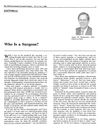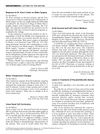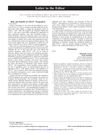 3 citations,
February 2020 in “Dermatologic Therapy”
3 citations,
February 2020 in “Dermatologic Therapy” Reducing micro-inflammation didn't change hair growth patterns in AGA.
3 citations,
August 2017 in “Dermatologic therapy” UVA-1 phototherapy might help treat alopecia areata.
3 citations,
February 2017 in “The American journal of medicine” A woman's heart failure improved after she added vitamins and changed her diet from only cheese chips and cake.
3 citations,
June 2016 in “JEADV. Journal of the European Academy of Dermatology and Venereology/Journal of the European Academy of Dermatology and Venereology” A patient with hair loss condition grew excessive hair in areas covered by a cast.
3 citations,
January 2015 in “Royal Society of Chemistry eBooks” Chocolate has potential health benefits.
3 citations,
January 2014 in “The Journal of Dermatology” Squaric acid dibutylester for alopecia areata can cause benign skin lymphoid growths.
 3 citations,
October 2010 in “Placenta”
3 citations,
October 2010 in “Placenta” The shape and size of the placenta may help predict future health risks for both mother and child.
 3 citations,
March 2000 in “The American Journal of Cosmetic Surgery”
3 citations,
March 2000 in “The American Journal of Cosmetic Surgery” A surgeon is defined by their ability to operate, not just formal training, and dermatologists can safely perform cosmetic surgeries.
 3 citations,
May 1999 in “Dermatologic Surgery”
3 citations,
May 1999 in “Dermatologic Surgery” Dr. Connelly agrees that linear basal cell carcinomas might be more aggressive but highlights the study's lack of clear criteria to identify them.
2 citations,
July 2022 in “Sexual Medicine” Certain medications, especially 5-α reductase inhibitors and neuropsychiatric drugs, are often linked to erectile dysfunction.
 2 citations,
October 2020 in “Journal of The American Academy of Dermatology”
2 citations,
October 2020 in “Journal of The American Academy of Dermatology” The authors suggest that scalp hair might protect against COVID-19 and call for more research on scalp health and the virus.
 2 citations,
May 2019 in “BioTechniques”
2 citations,
May 2019 in “BioTechniques” Industry 4.0 is transforming labs with new tools, making research more efficient and environmentally friendly.
 2 citations,
July 2009 in “Circulation Research”
2 citations,
July 2009 in “Circulation Research” CD133+ progenitor cells have therapeutic potential for diabetic ulcers and heart attack recovery, with manageable risks.
 2 citations,
November 1998 in “Journal of The European Academy of Dermatology and Venereology”
2 citations,
November 1998 in “Journal of The European Academy of Dermatology and Venereology” A patient with a severe type of hair loss experienced partial hair regrowth after treatment with a specific light therapy and a medication called interferon α2a.
 2 citations,
January 1980 in “Archives of Dermatology”
2 citations,
January 1980 in “Archives of Dermatology” The author suggests changing "telogen effluvium" to "telogen defluxion" for hair loss terminology.
 1 citations,
January 2001 in “Dermatologic Surgery”
1 citations,
January 2001 in “Dermatologic Surgery” Pulsed dye laser and hydrogel dressings effectively treat hypertrophic scars.
 1 citations,
June 2024 in “International Journal of Dermatology”
1 citations,
June 2024 in “International Journal of Dermatology” More research is needed to see if non-English speakers are also more interested in oral minoxidil.
 1 citations,
July 2019 in “Clinical Rheumatology”
1 citations,
July 2019 in “Clinical Rheumatology” Leflunomide is more likely to help treat alopecia areata than cause it.
 1 citations,
July 2000 in “Dermatologic Surgery”
1 citations,
July 2000 in “Dermatologic Surgery” Propofol can easily cause deep sedation, so caution is needed when using it for procedures.
 March 2007 in “The FASEB Journal”
March 2007 in “The FASEB Journal” Henna mixed with PPD can cause skin reactions, scarring, and a specific type of baldness, and needs more research to understand these effects.
 May 1999 in “Journal of Oral and Maxillofacial Surgery”
May 1999 in “Journal of Oral and Maxillofacial Surgery” The book provides practical guidance on cosmetic facial surgery for clinicians.

The book details advanced techniques in cosmetic dermatology for experienced surgeons.
 July 1996 in “Annals of Internal Medicine”
July 1996 in “Annals of Internal Medicine” Long-term high-dose fluconazole can cause reversible hair loss.
 January 1996 in “Lasers in Surgery and Medicine”
January 1996 in “Lasers in Surgery and Medicine” Dr. Walter P. Unger believes lasers could eventually be important in hair transplantation for achieving natural-looking results, despite current limitations.
 August 2024 in “Journal of Marine Medical Society”
August 2024 in “Journal of Marine Medical Society” Dermoscopy helps diagnose skin issues and warns against unqualified treatments.
 July 2024 in “The Journal of Dermatology”
July 2024 in “The Journal of Dermatology” A rare case shows alopecia areata and ITP occurring together, needing more research.
 April 2024 in “International Journal of Dermatology”
April 2024 in “International Journal of Dermatology” Oral minoxidil may worsen hangover symptoms when combined with alcohol.

Oral Minoxidil could be a safe and effective alternative treatment for various non-androgenic alopecias.
 August 2023 in “JAAD International”
August 2023 in “JAAD International” Low dose oral minoxidil is generally safe and can improve hair loss in women, with some experiencing side effects and minimal blood pressure changes.
 June 2023 in “Journal of cosmetic dermatology”
June 2023 in “Journal of cosmetic dermatology” Dermatologists should know hair prosthetic options to better help alopecia patients.
























